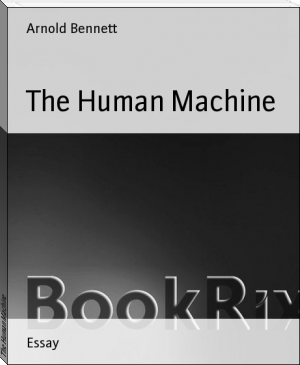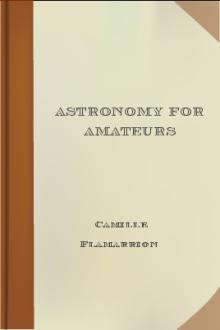The Human Machine - Arnold Bennett (sight word readers .TXT) 📗

- Author: Arnold Bennett
Book online «The Human Machine - Arnold Bennett (sight word readers .TXT) 📗». Author Arnold Bennett
However, the real reason why many people object to this truth is not because they think it involves the utter demolition of society (fear of the utter demolition of society never stopped any one from doing or believing anything, and never will), but because they say to themselves that if they can't blame they can't praise. And they do so like praising! If they are so desperately fond of praising, it is a pity that they don't praise a little more! There can be no doubt that the average man blames much more than he praises. His instinct is to blame. If he is satisfied he says nothing; if he is not, he most illogically kicks up a row. So that even if the suppression of blame involved the suppression of praise the change would certainly be a change for the better. But I can perceive no reason why the suppression of blame should involve the suppression of praise. On the contrary, I think that the habit of praising should be fostered. (I do not suggest the occasional use of trowels, but the regular use of salt-spoons.) Anyhow, the triumph of the brain over the natural instincts (in an ideally organised man the brain and the natural instincts will never have even a tiff) always means the ultimate triumph of kindness.
And, further, the culture of the brain, the constant disciplinary exercise of the reasoning faculty, means the diminution of misdeeds. (Do not imagine I am hinting that you are on the verge of murdering your wife or breaking into your neighbour's house. Although you personally are guiltless, there is a good deal of sin still committed in your immediate vicinity.) Said Balzac in _La Cousine Bette_, 'A crime is in the first instance a defect of reasoning powers.' In the appreciation of this truth, Marcus Aurelius was, as usual, a bit beforehand with Balzac. M. Aurelius said, 'No soul wilfully misses truth.' And Epictetus had come to the same conclusion before M. Aurelius, and Plato before Epictetus. All wrong-doing is done in the sincere belief that it is the best thing to do. Whatever sin a man does he does either for his own benefit or for the benefit of society. At the moment of doing it he is convinced that it is the only thing to do. He is mistaken. And he is mistaken because his brain has been unequal to the task of reasoning the matter out. Passion (the heart) is responsible for all crimes. Indeed, crime is simply a convenient monosyllable which we apply to what happens when the brain and the heart come into conflict and the brain is defeated. That transaction of the matches was a crime, you know.
Lastly, the culture of the brain must result in the habit of originally examining all the phenomena of life and conduct, to see what they really are, and to what they lead. The heart hates progress, because the dear old thing always wants to do as has always been done. The heart is convinced that custom is a virtue. The heart of the dirty working man rebels when the State insists that he shall be clean, for no other reason than that it is his custom to be dirty. Useless to tell his heart that, clean, he will live longer! He has been dirty and he will be. The brain alone is the enemy of prejudice and precedent, which alone are the enemies of progress. And this habit of originally examining phenomena is perhaps the greatest factor that goes to the making of personal dignity; for it fosters reliance on one's self and courage to accept the consequences of the act of reasoning. Reason is the basis of personal dignity.
I finish. I have said nothing of the modifications which the constant use of the brain will bring about in the _general value of existence_. Modifications slow and subtle, but tremendous! The persevering will discover them. It will happen to the persevering that their whole lives are changed--texture and colour, too! Naught will happen to those who do not persevere.
THE END
Imprint
And, further, the culture of the brain, the constant disciplinary exercise of the reasoning faculty, means the diminution of misdeeds. (Do not imagine I am hinting that you are on the verge of murdering your wife or breaking into your neighbour's house. Although you personally are guiltless, there is a good deal of sin still committed in your immediate vicinity.) Said Balzac in _La Cousine Bette_, 'A crime is in the first instance a defect of reasoning powers.' In the appreciation of this truth, Marcus Aurelius was, as usual, a bit beforehand with Balzac. M. Aurelius said, 'No soul wilfully misses truth.' And Epictetus had come to the same conclusion before M. Aurelius, and Plato before Epictetus. All wrong-doing is done in the sincere belief that it is the best thing to do. Whatever sin a man does he does either for his own benefit or for the benefit of society. At the moment of doing it he is convinced that it is the only thing to do. He is mistaken. And he is mistaken because his brain has been unequal to the task of reasoning the matter out. Passion (the heart) is responsible for all crimes. Indeed, crime is simply a convenient monosyllable which we apply to what happens when the brain and the heart come into conflict and the brain is defeated. That transaction of the matches was a crime, you know.
Lastly, the culture of the brain must result in the habit of originally examining all the phenomena of life and conduct, to see what they really are, and to what they lead. The heart hates progress, because the dear old thing always wants to do as has always been done. The heart is convinced that custom is a virtue. The heart of the dirty working man rebels when the State insists that he shall be clean, for no other reason than that it is his custom to be dirty. Useless to tell his heart that, clean, he will live longer! He has been dirty and he will be. The brain alone is the enemy of prejudice and precedent, which alone are the enemies of progress. And this habit of originally examining phenomena is perhaps the greatest factor that goes to the making of personal dignity; for it fosters reliance on one's self and courage to accept the consequences of the act of reasoning. Reason is the basis of personal dignity.
I finish. I have said nothing of the modifications which the constant use of the brain will bring about in the _general value of existence_. Modifications slow and subtle, but tremendous! The persevering will discover them. It will happen to the persevering that their whole lives are changed--texture and colour, too! Naught will happen to those who do not persevere.
THE END
Imprint
Publication Date: 08-17-2010
All Rights Reserved
Free e-book «The Human Machine - Arnold Bennett (sight word readers .TXT) 📗» - read online now
Similar e-books:





Comments (0)